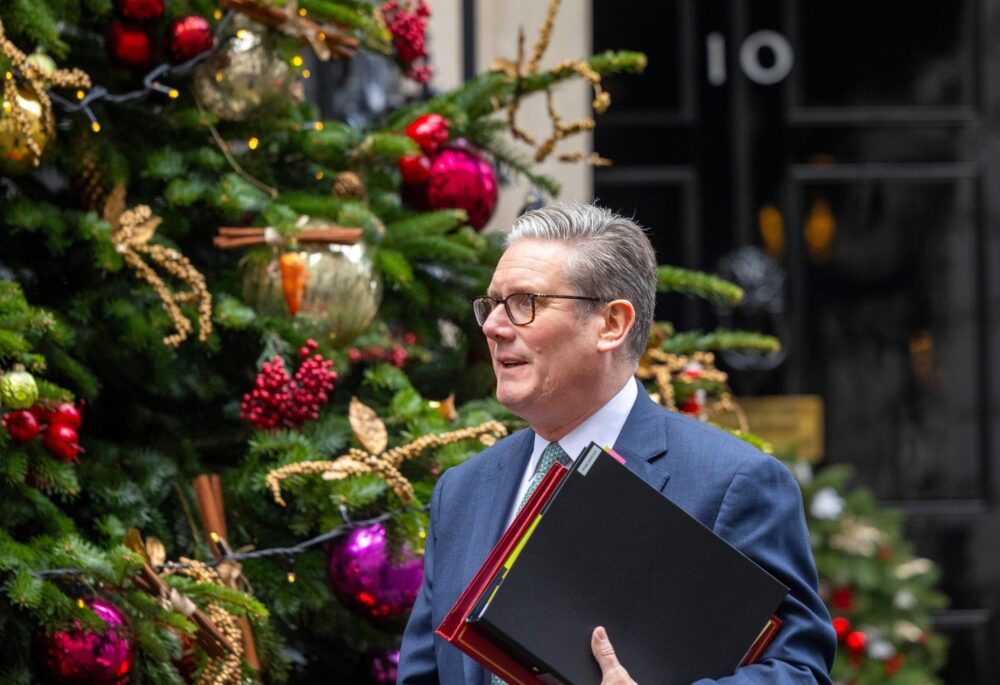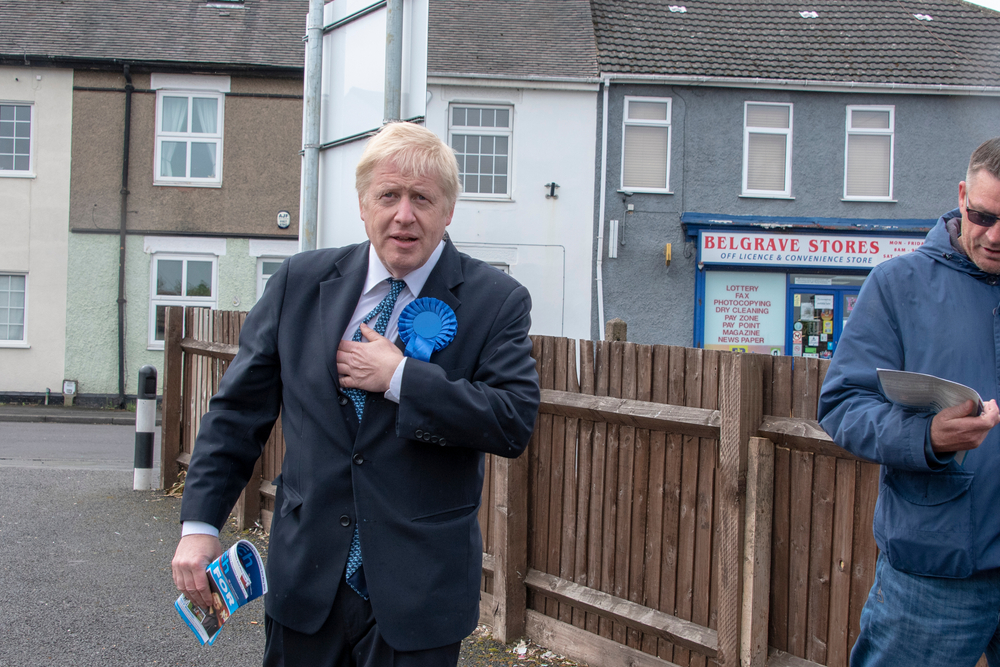
My latest poll finds that while individual Budget measures were popular, most voters think it leaves them and the country no better off and the Tories’ rating on the economy is down, as is their vote share. Meanwhile – among other things – will Boris Johnson’s return to the campaign trail likely to help Conservatives, would they do better with a new leader, do we need new laws on extremism, how willing are Labour and Lib Dem supporters to vote tactically, and who should play Rishi Sunak and Keir Starmer in the movie of their lives?
Boris and Blair: asset or liability?
News that Boris Johnson is set to return to the campaign trail in an effort to shore up the red wall coincided nicely with our question as to whether certain figures would be an asset or a liability on the campaign trail.
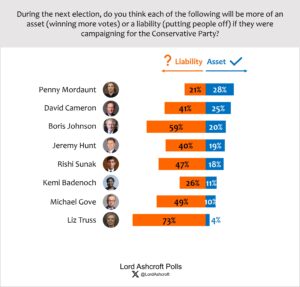
Voters as a whole thought Johnson would be a liability to the Tory campaign by 59% to 20% (with 2019 Tories saying the same by the narrower margin of 43% to 37%). Of the Conservatives we asked about, only Penny Mordaunt was considered more of an asset (by 28% to 21%).
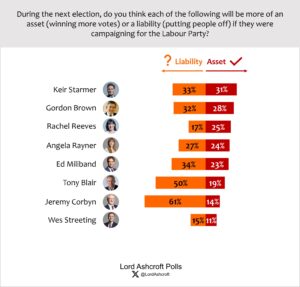
On the Labour side, the only figure to be considered a net asset was Rachel Reeves, though with 42% saying they didn’t know. Voters were closely divided as to whether Keir Starmer, Gordon Brown and Angela Rayner would gain or lose more votes for Labour. The biggest potential liabilities were Jeremy Corbyn (61%) and Tony Blair (50%).
Replace Rishi?
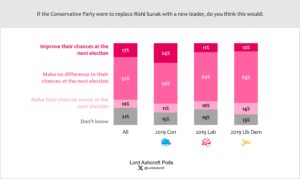
With the Conservative poll rating still in decline, speculation has continued that the party might choose a new leader before polling day. Only 17% of voters, including just under a quarter (24%) of 2019 Tories, think replacing Rishi Sunak would improve the party’s chances at the general election, while half think it would make no difference. Around 1 in 10 think another change of leader would make their chances worse.
The Budget
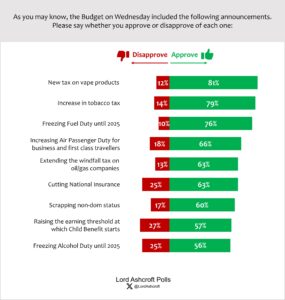
When we tested various individual measures in last week’s Budget, we found majorities approving of each one. The new tax on vape products, higher tobacco tax and fuel duty freeze were particularly popular. More than 6 in 10 (63%) also approved of the chancellor’s headline measure, the 2% cut in National Insurance.
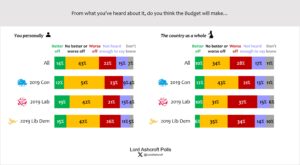
However, when asked about the overall effect, only 14% of voters said they thought the Budget would leave them better off personally, with 2019 Labour voters (19%) more likely to say this than 2019 Tories (12%). People were more likely to say they would be worse off than better off, and more likely still to say it would make no difference.
When we asked about the effect on the country as a whole, the balance was still more negative. Only 1 in 10 voters overall thought the Budget would leave the country better off, compared to nearly 3 in 10 (28%) who said it would make things worse. 2019 Conservatives were nearly twice as likely to say the Budget would make the country worse off (21%) as better off (12%).
Extremism
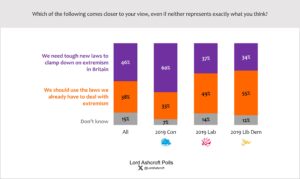
Following Rishi Sunak’s speech in the wake of the Rochdale by-election and growing tensions over Gaza, we found voters as a whole more likely to agree that we need tough new laws to clamp down on extremism (46%) than that we should use the laws we already have to tackle the problem. 2019 Conservative voters said that new laws were needed by nearly two to one, while fewer than 4 in 10 Labour and Lib Dem voters agreed. Those leaning towards Reform UK wanted to see new laws by 66% to 30%.
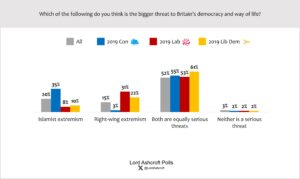
Asked what they thought was the bigger threat to Britain’s democracy and way of life, 20% named Islamist extremism and 15% named right-wing extremism, while more than half (52%) said both were equally serious threats. 2019 Conservatives said Islamist extremism was the bigger threat by 35% to 3%, while Labour voters named right-wing extremism by 31% to 8%. Only 3% of all voters said neither was a serious threat.
What’s been happening?
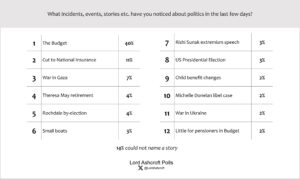
The Budget dominated people’s recollections of political news over recent days. Four in 10 mentioned it unprompted when asked, with a further 15% specifically mentioning National Insurance, child benefit changes and what they saw as lack of support for pensioners. Other political stories people remembered included Gaza, Theresa May’s retirement, the Rochdale by-election, small boats and Sunak’s speech on extremism, none of which were named by more than 7%.
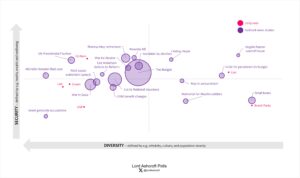
Our analysis also shows what kind of voters are most likely to have recalled each story. News about Angela Rayner’s council house and lack of support for pensioners in the Budget were most likely to have been noticed in prosperous Conservative-leaning territory, while stories about small boats were most likely to have been picked up in the less prosperous, Brexit-backing bottom right. Lee Anderson’s defection to Reform UK, Sunak’s extremism speech and Gaza were most likely to be mentioned in the more diverse and left-leaning left-hand side of the map.
Leadership and the economy
Keir Starmer’s lead over Rishi Sunak on who would make the best prime minister is up a point on last month, with Starmer unchanged at 33% and Sunak down to 19% – though nearly half (48%) of voters say “don’t know”. Only 42% of 2019 Conservatives name Sunak, while two thirds (67%) of 2019 Labour voters name Starmer. Those currently leaning towards Reform UK prefer Sunak to Starmer by 24% to 5%, with 71% unable to choose between them.
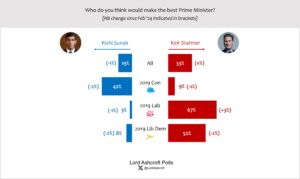
Despite the positive reception for some individual Budget measures, Labour’s lead on the economy is also up since February. Just over one third (35%) say they think Starmer and Rachel Reeves would do a better job, compared to 22% for Sunak and Jeremy Hunt; 43% say they don’t know. Fewer than half (47%) of 2019 Tories name Sunak and Hunt, as do only 28% of those leaning towards Reform UK – though only 7% of them think the Labour team would do a better job.
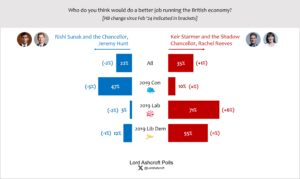
Only 7% of all voters (including just 9% of 2019 Tories) said they were satisfied with the current Conservative government, while a further 37% said they were dissatisfied but would still rather have this government than a Labour one. Just over half (56%), including one fifth of 2019 Conservatives, said they were dissatisfied with the Tory government and would rather have a Labour one instead. The overall figures were unchanged since last month.
Voting intention
We ask voters how likely they are to vote for each party at the next election on a scale from 0 to 100. Among 2019 Conservatives, the mean likelihood of voting Tory again was 42/100 (down from 48 in my February poll), while Labour voters’ likelihood of sticking with their party was 69/100 (up from 66 last month).
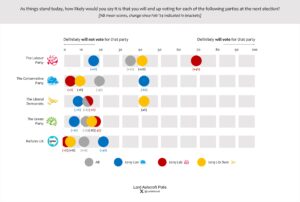
Taking those who put their chances of voting for their highest-rated party at 50/100 or above, the implied vote shares are Labour 45%, Conservative 23%, Reform UK 11%, Green 8% and Lib Dem 6%. In Scotland, Labour lead the SNP by 30% to 28%, with the Conservatives on 16% and the Greens and Reform UK tied on 7%.
Based on these scores, only 36% of 2019 Conservatives currently say they are likely to vote for the party at the next election, while 8% lean towards Labour, 14% lean towards Reform UK, and just over a third (34%) say they don’t know or will not vote.
How enthusiastic are you?
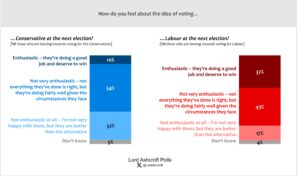
Only 1 in 10 of those currently intending to vote Conservative said they were enthusiastic about their vote (“they’re doing a good job and deserve to win”), compared to 37% of Labour supporters who said the same. A majority (54%) of Tory leaners said they were not very enthusiastic (“not everything they’ve done is right, but they’re doing fairly well given the circumstances they face”).
Nearly 1 in 3 (32%) Conservatives said they were not enthusiastic at all (“I’m not very happy with them, but they are better than the alternative”) – compared with just 17% of Labour voters who said the same of their party.
Tactical vote?
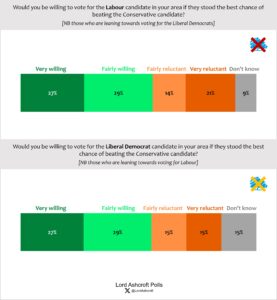
In the run-up to the Liberal Democrats’ spring conference this weekend, we asked those currently leaning towards Labour and the Lib Dems how willing they would be to switch their vote if the other party stood a better chance of beating the Conservatives in their area. In both cases, just over half said they would be willing to do, including 27% in both cases saying they would be “very willing”. However, Labour voters were more reluctant to switch to the Lib Dems than vice versa.
Election date
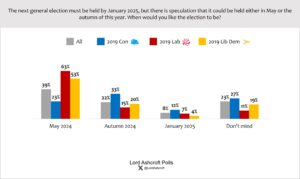
Amid continuing speculation that the PM was considering calling a spring election, we asked people how soon they wanted to go to the polls. Overall, 39% wanted an election in May (including 63% of 2019 Labour voters), compared to 22% who preferred the autumn and only 8% who wanted to wait until January 2025. Those who voted Conservative in 2019 preferred the autumn (33%) to May (23%), with just 12% wanting to wait until the last possible moment.
The political map
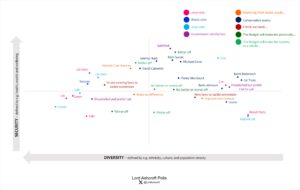
Our political map shows how different issues, attributes, personalities and opinions interact with one another. Each point shows where we are most likely to find people with that characteristic or opinion; the closer the plot points are to each other the more closely related they are. Here we see that the centre of gravity of the Conservative vote has shifted further into the more prosperous top right quadrant since 2019, and that those who think the Tories’ election chances would be improved by replacing Rishi Sunak are most likely to be found in the Leave-voting bottom right. This is also where we are most likely to find people thinking we need new laws to tackle extremism, and that the Budget would make the country worse off.
And finally
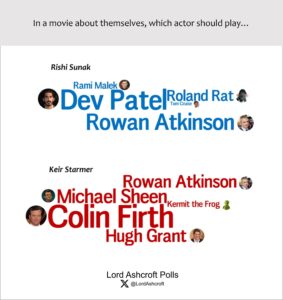
Over the Oscars weekend we asked people which actor ought to play Rishi Sunak or Keir Starmer in a movie about their lives. Dev Patel was the most popular unprompted choice to play Sunak, followed by Rowan Atkinson and Roland Rat. Rami Malek and Tom Cruise were also suggested by a number of participants.
Colin Firth was the clear favourite to play Starmer, followed by Michael Sheen, Hugh Grant and, again, Rowan Atkinson. Kermit the Frog also received a surprising number of nominations for the role.

